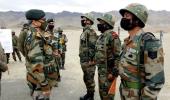'Having tied himself in knots, he just might take a decision which is dangerous, one that could take his nation to war.'

"Earlier, the world was rallying around diplomatically and politically, but now it is coming together even militarily.' Lieutenant General P J S Pannu (retd), former general officer commanding of the Leh-based XIV Corps, discusses the situation on the China border with Rediff.com's Archana Masih.
The eighth round of military talks is scheduled for today (November 6). What has been your assessment of the talk so far?
The background to the talks is based on a longstanding understanding between the two countries in the absence of a boundary settlement.
The talks are meant to keep the lines of communication open in order to settle disputes mutually and peacefully across the table.
These provisions include sending hotline messages and having border point meetings.
The limited deployment of the People's Liberation Army in certain areas of Eastern Ladakh resulted in a clash in Galwan on June 15-16.
The protocols for open communication between the two nations were broken and there was a breach of trust between India and China.
Therefore, it appears that those protocols don't have a future because both troops came eyeball to eyeball.
The Chinese never expected the Indians to retaliate immediately after the Galwan clash and cause heavy casualties. They were shocked.
Later, they were also surprised when the Indian Army occupied certain very strategically critical heights south of Pangong Tso.
This gave our troops the advantage of dominating the Maldo cantonment which is the only avenue from where the Chinese could have attacked critical areas in India's Chushul sector.
When these options got foreclosed and winter set in, the Chinese were on the backfoot. They understood that India had a clear advantage.
These two incidents:
1. The immediate reaction at Galwan, and
2. The occupation of South Pangong Tso have already given the Chinese a good indication that the Indians are not going to back off and will react in a violent manner if required.
What can we expect from the next round of talks?
The signalling from the political, diplomatic and seven rounds of military talks has never ever given the impression that we are weak and want to back off.
There have been certain developments between the last military meeting on October 12 and the eighth round of meeting today.
These include:
The Indo-US 2+2 meeting and the signing of four foundational agreements between India and USA.
The Malabar military exercises where Australia has joined for the first time, which indicates that Quad is more militarised.
Under the signing of the US-India Exchange Memorandum of Agreement (LEMOA) huge amount of winter clothing from the USA has already been delivered in Ladakh to Indian troops.
American equipment which was in the pipeline has started coming into the country, eg, assault rifles.
(COMCASA), the communications agreement will enhance communication and interoperability between American and Indian platforms.
We have already received Apache and Chinook helicopters, C 17s and J 130 Hercules aircraft; artillery guns and more equipment is in the pipeline. So, India is procuring a lot of American equipment.
The world is getting aligned and polarised in favour of the Quad. Quad is gaining strength and is being supported by some Western powers like Germany and France.
America and the West are less in favour of China, while China continues to have a close association with Pakistan and North Korea. These countries will do whatever China wants them to do.
The Russians seem to be getting closer to China, but Russia will not be dictated by the Chinese. Moreover, they already have some nagging border issues between them.
The Chinese have been watching all the developments between October-November, including the elections in America.
They did not want to have a meeting without inputs from the above developments. Based on the inputs of the 2+2, the defence agreements and the US elections, the Chinese will take a decision as to what signal they would give in the border talks today.
These talks are more for signalling and communicating through body language rather than negotiations and discussions.
Military commanders create conditions for the political leaders and it is up to the political leadership to take the discussions forward.
Military commanders, through their body language, also indicate the readiness for any future conflict if thrust upon them.

Do you think the Chinese are going to prolong this standoff?
I expect the Chinese will continue to maintain their unreasonable stance against India. Logic demands that a country which is an aggressor, should take the first step back.
Xi Jinping has to take that decision. He has already tied his feet too tightly to walk. Any direction he takes is going to make him fall. Xi's fall is inevitable.
Having tied himself in knots, he just might take a decision which is dangerous, one that could take his nation to war.
If that happens, the consequences are extremely serious and dangerous.
Earlier, the world was rallying around diplomatically and politically, but now it is coming together even militarily.
Feature Presentation: Aslam Hunani/Rediff.com











 © 2025
© 2025